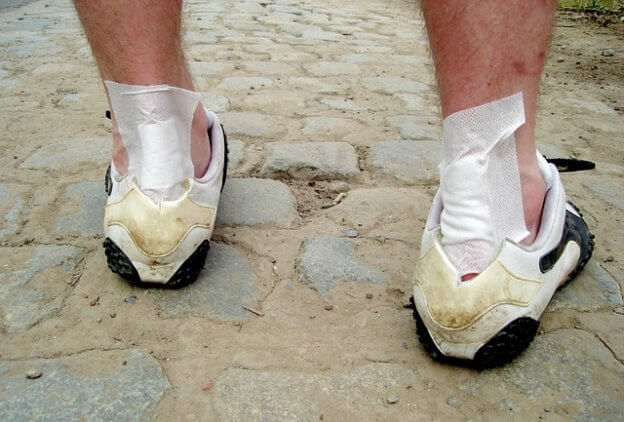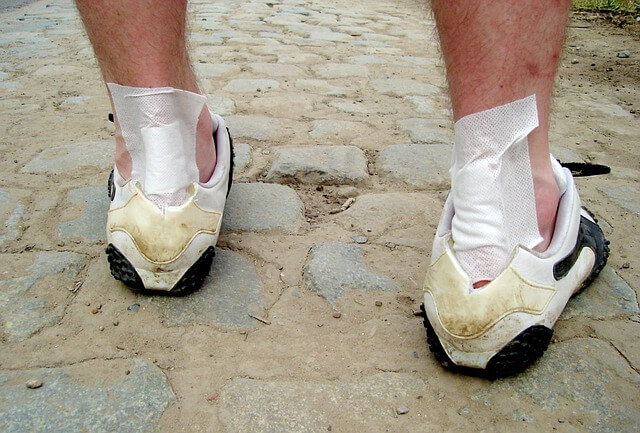Stopping Gout Together › Forums › Help My Gout! The Gout Forum › Pain in Ankle (gout worsening or improving?)
- This topic has 12 replies, 3 voices, and was last updated 4 years, 6 months ago by
d q.
-
AuthorPosts
-
-
September 20, 2018 at 11:07 pm #7816
d q
Participant
@nobody and @keith – hope you guys are well.
I noticed that my right ankle has swollen up and is a little painful. I can walk on it but its pretty uncomfortable (no way near the pain of gout in toe).
The question I had was; could this be a medium gout attack as a result of my uric acid levels dropping and the crystals are now dissolving in other joints or is this potentially a sign that levels are not low enough and crystals are now forming in my ankle?
Ultimately, do we get gout attacks in the ankle during the long gout recovery road or are ankle gout attacks only seen in the gout worsening road..? :/
Next blood test due in a few days!
Thanks
-
September 21, 2018 at 8:34 am #7822
nobody
ParticipantIf you can walk at all on an inflamed ankle it can’t be that bad. In my experience the toe is indeed more painful at rest but trying to walk on an inflamed ankle is another matter entierly!
For what it’s worth I don’t think I’ve had crutches-grade ankle pain while my blood tests were satisfactory. I wouldn’t make much of this episode as long as it remains mild. Annoyances are going to happen while you are curing gout.
Crystals should form quite slowly and shouldn’t form at all if your SUA is low enough most of the time. Don’t worry about that. -
September 21, 2018 at 9:33 am #7823
d q
ParticipantFair enough – good news!
I took one colchicine tablet last night as a precaution which didn’t seem to do much but as I say the pain is generally bearable (so far).
However (maybe for general knowledge sake) is this normal during the healing part of gout or is this not normally the case or not normally common?
Thanks buddy
-
September 21, 2018 at 5:49 pm #7840
d q
ParticipantBumped into my GP on the way back from work! Mentioned the situation to her and she said its unlikely related to gout if the pain is also in the calf muscle. I asked about DVT and she said my calf muscle would be super stiff if it was that.
She said its probably over exertion from all the standing and uncomfortable sitting from the hospital and if it gets worse take some anti-inflammatories but it should clear up in a few days. Does colchicine constitute an anti-inflammatory in these cases or is it predominantly used in gout related inflammation cases only?
Crystals should form quite slowly and shouldn’t form at all if your SUA is low enough most of the time. Don’t worry about that.
I really hope this is the case @nobody because the next stage is upping the dose(p.s. keep an eye out for the email exchange thread)
-
September 23, 2018 at 8:22 am #7869
 Keith TaylorParticipant
Keith TaylorParticipantFirst
(p.s. keep an eye out for the email exchange thread)
I’m happy to act as a private information exchange. I’ve been thinking about adding private groups. Where only invited group members have access to restricted information. In the meantime, if anyone wants to mutually exchange any personal details:
1. Both open a Helpdesk ticket.
2. I’ll cross-forward your messages.Before anyone says that the info isn’t private because I see it. That’s the whole point. I always had access to private messages when that service was available though I never routinely checked. However, I got a complaint about a member spamming other members. So, unfortunately, private messaging will never happen on my watch.
Anyway, that’s off-topic, so feel free to post it in your email exchange thread.
Next
Have you considered adding a brief note of your uric acid test history to your profile @d-q ?Because
The question I had was; could this be a medium gout attack as a result of my uric acid levels dropping and the crystals are now dissolving in other joints or is this potentially a sign that levels are not low enough and crystals are now forming in my ankle?
Uric acid over 6.5 mg/dL – almost certainly new crystals.
Uric acid below 6 mg/dL – almost certainly old crystals dissolving.
In between – consider temperature and 12 hours food intake.As for the calf pain, you didn’t mention that in your original post. Did it develop as you limped through your day? Because I’ve had that.
Finally
Does colchicine constitute an anti-inflammatory
Colchicine is anti-inflammatory in the sense that it limits the spread of inflammation. But pre-existing inflammation needs NSAIDs or similar to actually reduce swelling. Unless you wait for it to disperse naturally.
-
September 26, 2018 at 7:57 pm #7876
d q
ParticipantI’m happy to act as a private information exchange
Sounds good. I’ll drop you a message at some point so you can relay it to @nobody.Have you considered adding a brief note of your uric acid test history to your profile
I will most certainly look into this. It’s just my present situation is a little elastic (until we find the maintenance dose anyway).Uric acid over 6.5 mg/dL – almost certainly new crystals.
Uric acid below 6 mg/dL – almost certainly old crystals dissolving.
In between – consider temperature and 12 hours food intake.What a simple yet extremely helpful scale. Thanks!
As for the calf pain, you didn’t mention that in your original post. Did it develop as you limped through your day? Because I’ve had that.
Actually the ankle pain and the calf pain both set in at the same time. Literally together. The bottom of the ankle joint is painful and slightly inflamed and the calf muscles also hurts. I’ve started a short course of Naproxen (250mgs twice a day) to see if it helps. I’m two days into this and will probably continue for another two days. It ‘seems’ to be a little better but I will watch it. Both my GP and Podiatrist do not think it’s gout and more to do with prolonged standing however my Podiatrist said ‘see how it goes for another few days’ and to get back to him if there is no recovery. He also mentioned to avoid the Naproxen course if possible and just stick to a few topical solutions like Deep Relief gel first. Maybe I’ll take Naproxen for one more day then try the gels.
Colchicine is anti-inflammatory in the sense that it limits the spread of inflammation. But pre-existing inflammation needs NSAIDs or similar to actually reduce swelling. Unless you wait for it to disperse naturally.
Thanks for this, just out of interest, if one was to wait for inflammation to disperse naturally should a time limit be set on how long to wait before using drugs? Does playing the waiting game cause more harm then good after a set period of time?
Thank you so much @keith
-
September 27, 2018 at 11:52 am #7878
 Keith TaylorParticipant
Keith TaylorParticipantI think the time limit is a personal issue. Because we all have different tolerances. So in the studies I reviewed in How Long Does Gout Last If Untreated, we see varying percentages of natural pain dispersal in 2 to 5 days.
Now for some people, an 18% reduction might be OK. Others might need a 50% reduction but some might want no discomfort at all. So all we can be certain of is that gout pain will definitely resolve itself in a few days. Therefore it’s up to each individual to decide if they need pain medication or not.
Some might say the side effects of drugs means they’d rather endure the pain. Others might say they need the pain meds to be able to work. But I can’t see how any harm can come from delaying colchicine, NSAIDs, or other pain relief.
-
September 30, 2018 at 11:00 am #7908
d q
ParticipantHi @keith – I vaguely remember reading somewhere maybe even a comment on this site saying something like leaving inflammation long term or sticky inflammation can actually cause harm or damage to the site and should be tackled with anti-inflammatories if it drags along too long (whatever long means..?). I wish I can find the reference to it. Is this true? Thanks as always @keith
-
October 1, 2018 at 8:18 pm #7910
 Keith TaylorParticipant
Keith TaylorParticipantThat’s not something I can consciously recall, @d-q . So either, I never heard it before. Or it was so long ago (pre-September 2018) that I’ve forgotten 🙂
What’s worse is, I cannot think of anything specific to start researching at the moment. So, I’ll sleep on it. Then 2 things could happen:
Either my subconscious will wake me in the night and I’ll come up with something useful.
Or I’ll have forgotten this! 😉
Night Night
-
-
October 5, 2018 at 11:59 am #7983
-
October 7, 2018 at 1:53 am #7984
 Keith TaylorParticipant
Keith TaylorParticipant[fx rubs eyes, waking up]
Morning mate 🙂 No – you did 😉I definitely cannot recall anything like this directly related to gout. However, indirectly a lot of gout patients also have metabolic syndrome. So that includes some low-level systemic inflammation. E.g. atherosclerosis. But it’s something you have to talk with your doctor about. Because it’s outside my knowledge and outside the scope of this website. Although that doesn’t preclude me researching it elsewhere if there’s sufficient interest.
I think the problem you mentioned might be related to plaque build-up in blood vessels as a result of our bodies reaction to inflammation. But I’ve never come across any link between gout and plaque before (except as the French for taste and plate!)
-
October 7, 2018 at 2:21 am #7986
 Keith TaylorParticipant
Keith TaylorParticipantOOps! I might need to retract my last comment. Because after I posted it I looked for links between gout and atherosclerosis. Now it gets tricky!
My first likely result was:
Krishnan, Eswar. “Inflammation, oxidative stress and lipids: the risk triad for atherosclerosis in gout.” Rheumatology 49, no. 7 (2010): 1229-1238.That review has a section, “Gout and hyperuricaemia and inflammation”, which implicates gouty inflammation as a probable cause of atherosclerosis. Though there are likely to be genetic factors. Significantly, uric acid itself is likely to cause atherosclerosis. So it’s a double-whammy! Or actually, a triple whammy when gout-related oxidative stress is considered. Hence the “risk triad” in the title.
Now, none of that suggests that it is healthier to take anti-inflammatories to remove one of the three threats. Because there might also be cardiovascular risks from anti-inflammatory meds. So this is exactly the type of risk management situation that doctors get paid for.
I’m happy to find some relevant research to enhance your discussions with your medical team (I bet they hate me). But I guess you can only be guided by a thorough physical examination of how inflammation is affecting your body. In any event, the best solution has to be to get uric acid down. So how’s that going?
-
October 9, 2018 at 6:43 pm #8083
d q
ParticipantThank you so much @keith 🙂
I’ll do a little question answer session with my next appointment with the rheumatologist. p.s. He doesn’t hate you at all. If anything he loves you because I’ve ultimately treated myself with all the information I take to him so he has less work 🙂
The current uric acid levels situation is another story which I will post in the catch up thread.. it’s an interesting one and I’ll be sure to need your input in that one!
p.s. sorry for waking you up! 🙂
-
-
AuthorPosts
The forum ‘Help My Gout! The Gout Forum’ is closed to new topics and replies.

